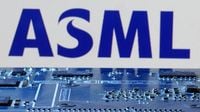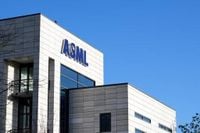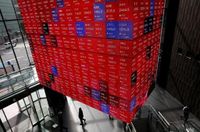ASML, a leading player in the semiconductor industry, reported a total of €7.7 billion in net sales and €2.4 billion in net income for the first quarter of 2025, slightly below expectations. CEO Christophe Fouquet expressed optimism about the company's outlook despite potential disruptions from U.S. trade tariffs, which have created a cloud of uncertainty over the market.
While ASML's revenue figures showed resilience in a dynamic market, the company has faced challenges, particularly concerning its net bookings. The firm reported that it missed some booking targets, which has raised concerns among investors and analysts alike. The semiconductor sector is currently navigating through a complex landscape shaped by geopolitical tensions and fluctuating trade policies.
During a recent earnings call, Fouquet highlighted the importance of ASML's advanced technologies and broad customer base in supporting the company's performance. He noted that despite the tariff-related uncertainties, there are positive signs emerging from customer engagements. The semiconductor industry, he pointed out, is poised to benefit from the increasing demand for chip technology driven by artificial intelligence and digital transformation.
However, the broader implications of U.S. trade policies remain a significant concern. According to Fouquet, the newly announced tariff measures could disrupt global supply chains and impact customer demand. "The uncertainty surrounding trade policy could substantially affect ASML and the wider semiconductor sector," he warned. This sentiment is echoed by many analysts who are closely monitoring the potential fallout from these trade measures.
On the European markets, investor sentiment was notably affected by these developments. The pan-European Stoxx 600 index saw a drop of 0.8% as of 9:56 a.m. U.K. time on April 16, 2025. ASML's shares fell by 4.6%, reflecting the market's reaction to the company's disappointing net bookings and the ongoing uncertainty regarding U.S. tariffs. Another industry player, ASM International, also experienced a decline of 3.5% in its stock price.
Amid these challenges, ASML remains committed to its research and development efforts, investing €1.2 billion in R&D during the first quarter of 2025. This investment is crucial for maintaining the company's competitive edge in a rapidly evolving market. With projected total net sales for 2025 between €30 billion and €35 billion, ASML is confident about the future demand for its technologies, particularly as the complexity of semiconductor manufacturing continues to grow.
The company has also announced plans to return significant capital to shareholders, including a €2.7 billion share buyback program and dividends. This strategy is aimed at preserving shareholder value while navigating through the uncertainties posed by external conditions.
Fouquet emphasized that ASML's strong market position and the robustness of its product portfolio are key factors that will help the company weather potential storms ahead. "Despite the short-term challenges, we are focused on R&D and enhancing our product offerings to meet the demands of the future," he stated.
In terms of market dynamics, ASML's leadership in extreme ultraviolet (EUV) technology is particularly noteworthy. EUV accounted for €1.2 billion of net bookings in Q1 2025, underscoring ASML's pivotal role in the semiconductor supply chain. The increasing reliance on advanced semiconductor solutions, driven by the rise of AI applications, further solidifies ASML's importance in the industry.
As the company navigates these turbulent waters, it remains focused on strategic partnerships and product differentiation as vital components of its business model. The ongoing economic pressures and tariff uncertainties necessitate a careful approach to innovation and operational adjustments.
Looking ahead, the semiconductor industry is expected to continue evolving, and ASML is well-positioned to capitalize on long-term trends. The company's commitment to maximizing shareholder value through strategic decision-making reflects its proactive stance in adapting to an increasingly complex market environment.
In a related context, the U.K. inflation data released on the same day showed a rate of 2.6% for March, slightly below the 2.7% forecast in a Reuters poll. This economic backdrop is crucial as investors assess the implications of inflation on market performance.
Moreover, Chinese state data indicated that the economy expanded by a better-than-expected 5.4% in the first quarter. However, the looming threat of tariffs prompted major investment banks to adjust their annual growth outlook for China, highlighting the interconnected nature of global markets.
As ASML continues to adapt to these evolving circumstances, its focus on innovation and strategic growth will be essential in maintaining its leadership position in the semiconductor sector. The coming months will be critical as the company responds to both market demands and potential regulatory challenges.


![[News] ASML Sees Q2 Sales Slipping, Warning 2025 Revenue May Hit Low End of Forecast | TrendForce News](https://thumbor.evrimagaci.org/XFkWJhg2hfXY5YGst12E4HEUmfQ=/200x0/tpg%2Fsources%2Fe94f1b98-1822-4085-8204-4af4a3d4a541.jpeg)




